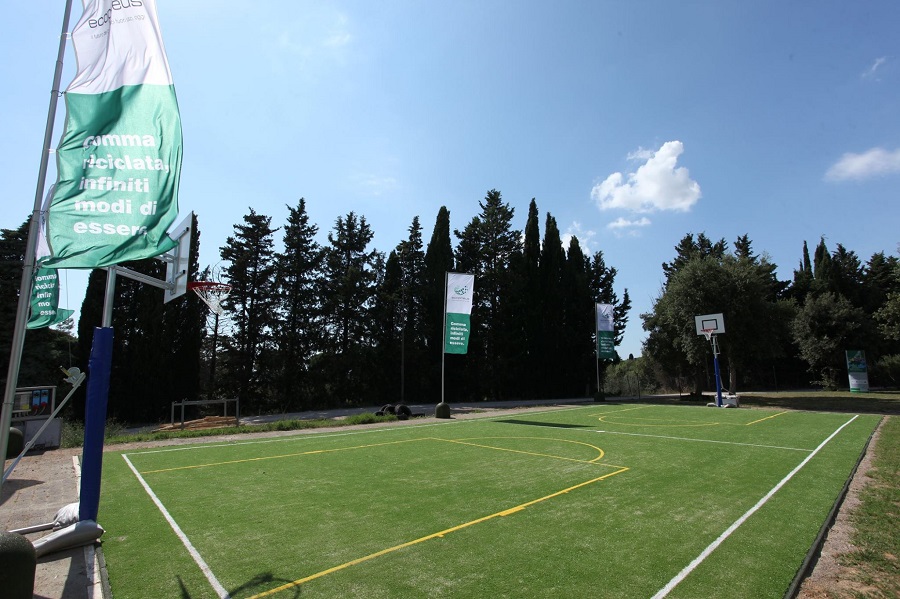Ecopneus comments on the vote held on 26th April in Brussels. It will lead to the banning of polymeric infill in synthetic turf sport surfaces – the main destination of rubber recycled from ELTs.
A meeting will be held in Rome on 23rd May to launch an alarm on the future of the sector and the circular economy in Italy .
It is not the final formal step; however, the vote held on 26th April in Brussels marked a point of no return for the chain of the recycling of End-of-Life Tyres (ELTs) in Italy .
Thanks to an efficient tracking, collection and recycling system, every year, about 400,000 tonnes of automobile, motorbike and truck tyres are transformed into valuable material that can be reused in several highly-performing applications – from road asphalts, to sport surfaces, anti-shock mats and anti-vibration systems – or recovered for energy production.
Ecopneus is the main operator in the management and recovery of ELTs in Italy. It would like to express all its preoccupation with reference to the perspective of losing the main application for the use of recycled rubber in Italy and Europe: synthetic turf sports surfaces – especially regular-sized, 5-a-side football pitches and rugby. They are mainly used for amateur sports practice, although even professional players regularly use these surfaces. The transition period has been set at 8 years; however, the consequences are expected to be felt long before this deadline.
About 5,000 sport installations will be affected in Italy. Over 1,600 of them were homologated by the National Amateur League. As such, they were created complying with the most advanced technical and sustainability requisites, even for what concerns the reduction of the risk of dispersion of the performing infill used for the installations – usually composed of recycled rubber granules.
Indeed, thanks to the use of physical barriers, grids, brushes and mandatory routes (already provided for by the League’s homologation specifications), such risk can be reduced by over 97%. This has been demonstrated by many research studies carried out both in Italy and abroad (in particular, in Spain and Denmark). They have shown that these devices are easy to install and are financially sustainable for sports centres.
Despite the work carried out by Ecopneus and many other bodies of the national chain for ELT recycling, the manufacturing companies and the users of recycled rubber granules, the approval of the ban proposal by the European REACH committee of 26th April 2023 will force the sector to deeply change. This puts at risk the reaching of the sustainability objectives of the chain of ELTs that every year recovers over 100% of the target set by the law either as material or energy recovery.
 The restriction proposal will be subject to examination and vote in both the European Parliament and Council in the next three months. It will have relevant consequences also for what concerns the survival of the Italian treatment companies. These are a solid chain and have worked on quality and investments in the course of the years.
The restriction proposal will be subject to examination and vote in both the European Parliament and Council in the next three months. It will have relevant consequences also for what concerns the survival of the Italian treatment companies. These are a solid chain and have worked on quality and investments in the course of the years.
Finally, the impact on sports practice in Italy is to be highlighted, as it will affect thousands of amateur sports associations. They will eventually be forced to replace excellent synthetic turf pitches that have been used even for sport competitions at European level with alternative solutions. As of today, the latter are not able to assure market availability, durability in time, playability during all year and sustainability.
The General Manager of Ecopneus, Federico Dossena, declared: “The current scenario is critical for the national system of End-of-Life Tyre (ELTs) recycling, for the survival of the companies of the chain, and for the amateur and professional sports practice, both in Italy and abroad. We believe that the proposal approved by the REACH Committee as currently drafted may have a disproportionate effect compared with its associated risk of dispersion. It may generate greater damage than the problem it aims at solving. As such, it is of fundamental importance to take into consideration the environmental benefits and try to find alternative sustainable solutions to valorise ELTs and promote the circular economy”.
In order to face these crucial issues, Ecopneus and Unirigom called for a meeting in Rome on 23rd May. All technical and institutional stakeholders will take part in this meeting to present ideas for the future of the whole sector and ask the Institutions of competence for a concrete effort to promptly act in support of a crucial sector for the development of the Italian circular economy.
About 90% of synthetic turf football pitches in Europe currently use polymeric infill recycled from End-of-Life Tyres, as no other technological solution can replace rubber for what concerns its performances and availability on the market.
It is estimated that there are over 21,000 synthetic turf regulation-sized football pitches in Europe subject to homologation from the part of the bodies in charge. Moreover there are over 72,000 pitches not subject to homologation and over 90-95% of these pitches use polymeric infill.
The sports surfaces made with this technology represent a high quality, performing application that complies with sports needs at all levels. Moreover, they allow to save up to 75% of the water needed to keep natural turf pitches in good condition, preserving athletes’ wellbeing at the same time. Such surfaces comply with the sports and safety criteria set by European standards and bodies of reference such as FIFA and World Rugby. Thanks to their performances, these sports surfaces offer many advantages, such as an extraordinary restitution of elastic energy to athletes, shock absorption, and the softening of micro-shocks. Moreover, they assure great resistance in all weather conditions.
A ban on the use of recycled rubber granules in football pitches will cause a drastic reduction in the quantities of ELTs destined to material recovery. This will significantly shift the balance towards energy recovery on plants that have already demonstrated limited absorption capacity. This will lead to important losses of the environmental benefits deriving from rubber recycling. Indeed, it has been estimated that the use of rubber as infill in synthetic turf pitches allows to avoid the emission of 371,000 tonnes of CO2eq in the EU every year. This amount corresponds to the one absorbed by 231,000 hectares of forest. Such benefit is 4.3 to 4.9 higher than the one of energy recovery, as demonstrated by several studies carried out on the life cycle of ELTs.

 Collect ELT
Collect ELT